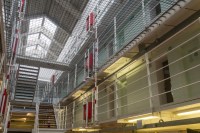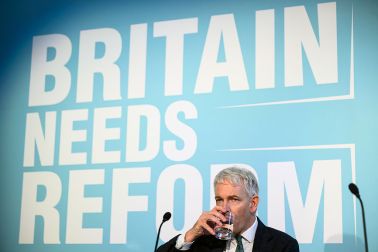It is all the fault of John Tusa. He’d been slated to give a lecture to launch the RSC’s autumn festival of new work. This year’s focus has been on the West’s relationship with what is usually called the developing world. The talk was to have been at 11.00 a.m., and I’d booked into a hotel for the previous night. But when Tusa cancelled I did the same for the room. Time enough to drive up on the day for the first event at 2.30 p.m. But that was without reckoning on a massive blockage of the M6 due to a serious accident.
After a couple of hours, the local radio station said we’d be lucky to be moving by 6 p.m. And then, just as we were considering an in-car enactment of Breakfast with Mugabe (whose text I had prudently obtained in advance), the traffic began to move. We arrived too late for the two short plays by young American writers, which I’d particularly wanted to see.
If I could have chosen anything to have missed it would have been the well-known journalist Yasmin Alibhai-Brown’s 75-minute monologue. Modishly billed as a ‘testimony’, it was an emotional account of her uncomfortable upbringing as an Asian in Uganda, and of her apparently scarcely less uncomfortable life in the UK. Nothing wrong with emotion, but it’s what you do with it that counts.
Much of what she had to say about finding herself in a no-woman’s land between white and black cultures was delivered with humour and hit home. This former Juliet in a Kampala school production of Romeo and Juliet also vividly invoked the special intensity of the play for a racially divided community. But she stepped right off the carpet with an indiscriminate assault on Tony Blair and Michael Howard for ‘scourging the poor immigrant’. Alibhai-Brown is confusing polemics with theatre.
After this, believe it or not, it was a great pleasure to take Breakfast with Mugabe, this being the title of a new play by Fraser Grace. It was already a good sign that it was to be directed by Antony Sher, nor did he and his terrific cast let us down. There’s nothing like seeing living dictators being put up for trial on stage — certainly more satisfying than watching their live performances for the television cameras. By uncanny coincidence, the arraignment of Saddam Hussein in his steel playpen began on the very same day.
Grace’s play actually sets up not so much a trial as a contest between Mugabe (Joseph Mydell) and a fictitious white psychiatrist, Dr Peric (David Rintoul), who’s been summoned to cure the president of the ngozi, or unquiet spirits, who are destroying his sleep. Peric attempts to establish control in the time-honoured style of ‘I doctor, you patient’. Of course Mugabe has none of it, putting Peric firmly in his place by insisting that he’s improperly dressed for the presidential palace and must choose a new tie from a selection produced by a bodyguard.
Ratcheting up his brusquely military tone of command, Peric attempts to regain a semblance of control. But he’s thwarted not just by his ‘patient’, but also by the president’s glamorous young wife Grace (Noma Dumezweni), who wants to enlist Peric’s aid in persuading Mugabe to allow her and her children to leave the country. There’s further trouble from a bodyguard who scorns Peric’s crassly stupid bribe and refuses to identify one or two potentially troublesome ngozi from old photographs. The performances are electric and among the very best seen at Stratford for some time.
Things, though, are not at all what they seem, as emerges from the moment you gather Peric is also a tobacco-grower, with war veterans occupying his farm. If the contest between the president and his psychiatrist is an unequal one, with a terrifying outcome for the latter, it makes for gripping theatre, all the more so in that Fraser Grace keeps you guessing whose side, if anyone’s, he’s on. Mugabe is as sharp as he is wily, not at all a caricature. Peric is harder to fathom. He’s married to a black woman, is a good doctor who has done blacks and whites equal service and considers himself as rooted in the country as Mugabe.
You do get the idea that the president’s cure for his country is worse than the disease inflicted upon it by the whites, but the politics remain somewhat simplistically handled. There’s little sense that the Mugabe in front of us is starving his people, four million of whom are dependent on the World Food Programme. This is the Mugabe who last week had the effrontery to address a conference in Rome on world hunger. It’s only surprising that he isn’t plagued by every ngozi in Africa. Driving home along the now sweetly flowing motorway, we heard on the radio that 200,000 were expected to die in Zimbabwe over the next year. Don’t let this put you off seeing the play (it’s likely to travel to London soon). It makes a powerful contribution to a much wider debate.





Comments